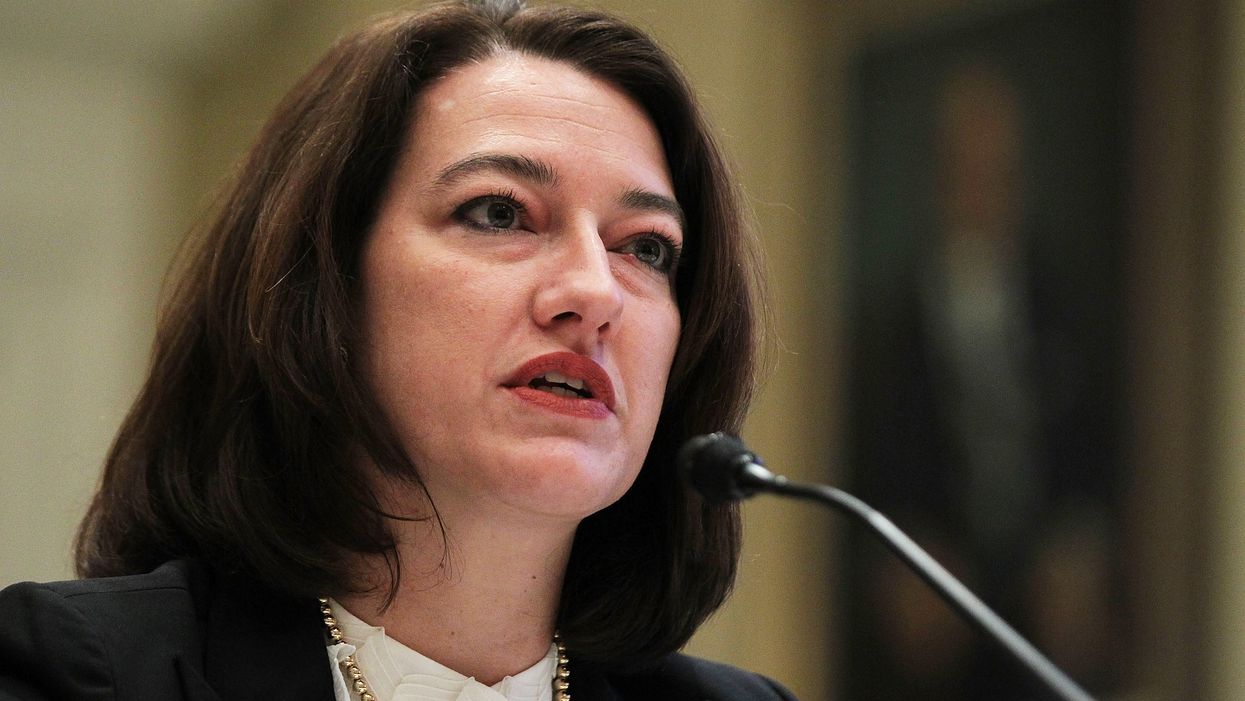UPDATES with President Trump's nominee for the new vacancy.
The Federal Election Commission will be totally toothless once again.
Commissioner Caroline Hunter announced Friday that she's resigning at the end of next week, leaving the panel with just three members and therefore no quorum.
Her departure will come just 29 days after the arrival of fellow Republican Trey Trainor, a Texas campaign finance attorney. His party-line confirmation by the Senate in May restored a quorum to the commission for the first time in more than nine months — the longest period in the 45-year history of the agency charged with regulating donations to and spending by campaigns.
The resignation took her fellow commissioners by surprise, but not the White House. Hours later, President Trump said he was nominating Allen Dickerson, who's now legal director at the Institute for Free Speech, a conservative nonprofit devoted to campaign finance deregulation.
In her resignation letter, Hunter said it was time for the agency to benefit from "new faces and fresh perspectives." But she urged Trump to choose a successor committed, as she has been, to protecting the First Amendment right of contributors to make unlimited and unregulated donations.
That is precisely what Dickerson's career has been about. And, in the decade since the Supreme Court's Citizens United decision expanded its money-is-free-speech rationale — allowing businesses and unions as well as individuals to give as much as they like — Hunter often opposed efforts at the agency to set structure and boundaries around the flow of campaign cash.
It was not immediately clear how quickly Majority Leader Mitch McConnell, an ardent campaign finance deregulator, would arrange for Senate confirmation — or how hard the Democrats would work to delay if not prevent it.
The Senate's schedule is limited between now and the election, and Democrats will surely oppose any nominee who is not paired with someone they approve of.
Presidents have traditionally forwarded nominees for the commission in bipartisan pairs, but Trump has now put forward two Republicans in a row. Democratic senators have pushed for the president to also nominate FEC attorney Shana Broussard, who would be the commission's first Black member.
In the meantime, a return to limbo means the commission cannot address more than 300 cases pending on its enforcement docket — or any new ones brought against presidential or congressional candidates or the organizations hoping to steer money in their direction during the next four months.
Although the panel is largely deadlocked even when there is a quorum, because no party can hold more than half the seats and four votes are required for action, the result for the time being is a nearly totally hands off regulatory approach to the flow of several billions of dollars in political money.
The FEC will not even be able to conduct routine audits of federal candidate fundraising and spending, work that usually proceeds even when the commissioners are in partisan paralysis.
Last week the commission held its first meeting since August, but nothing controversial was on the agenda and no substantive decisions were made. No meetings can be held unless there's a quorum.
Hunter had been on the commission since 2008 and her term had expired six years ago, but the law had allowed her to stay on.
In her letter, Hunter also called out — although not by name — her Democratic panel colleague Ellen Weintraub, with whom she often butted heads.
"One commissioner — who has served for more than a decade past the expiration of her term — routinely mischaracterizes disagreements among commissioners about the law as 'dysfunction,' rather than a natural consequence of the FEC's unique structure, misrepresents the jurisdiction of the agency and deliberately enables outside groups to usurp the Commission's role in litigation and chill protected speech," she wrote. "The American people deserve better."
In response to the resignation, Weintraub said, "It's keenly disappointing for the FEC to lose its quorum in just a blink of an eye after we regained it. But of course I wish Caroline well in this and all her future endeavors."
Good-government groups had largely opposed Trainor's confirmation because of his deregulatory approach, but they were also critical of the long period of inertia at the agency.
"It is deeply disheartening and concerning that the FEC will again be missing in action," said Meredith McGehee of the democracy reform advocacy group Issue One. (It operates but is journalistically independent of The Fulcrum.) "The American people need a watchdog devoted to enforcing the anti-corruption laws on the books and ensuring transparency of the billions of dollars being spent to influence their votes."
Hunter is joining the legal team of Stand Together, a criminal justice reform nonprofit founded by the long-prominent conservative political financier Charles Koch.
Before joining the FEC she was a member of the Election Assistance Commission after working as a lawyer in the George W. Bush White House and for the Republican National Committee.




















Trump & Hegseth gave Mark Kelly a huge 2028 gift